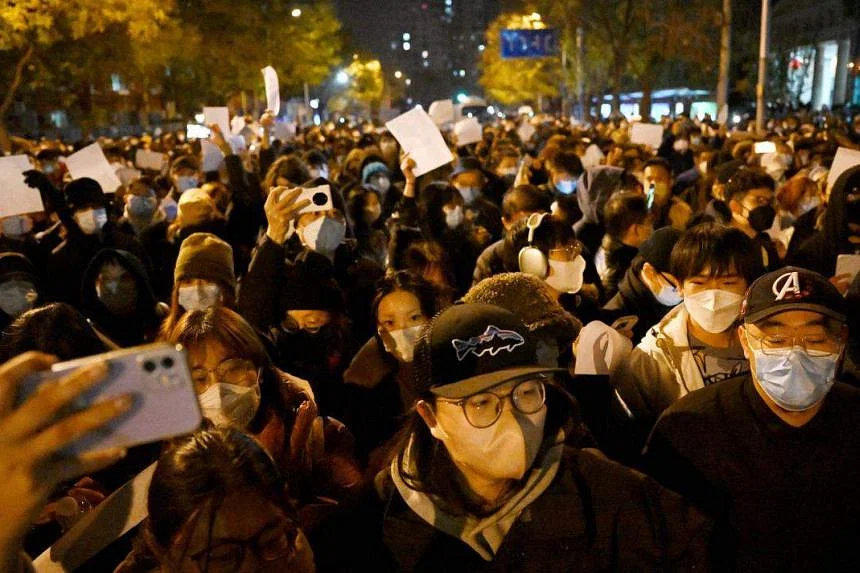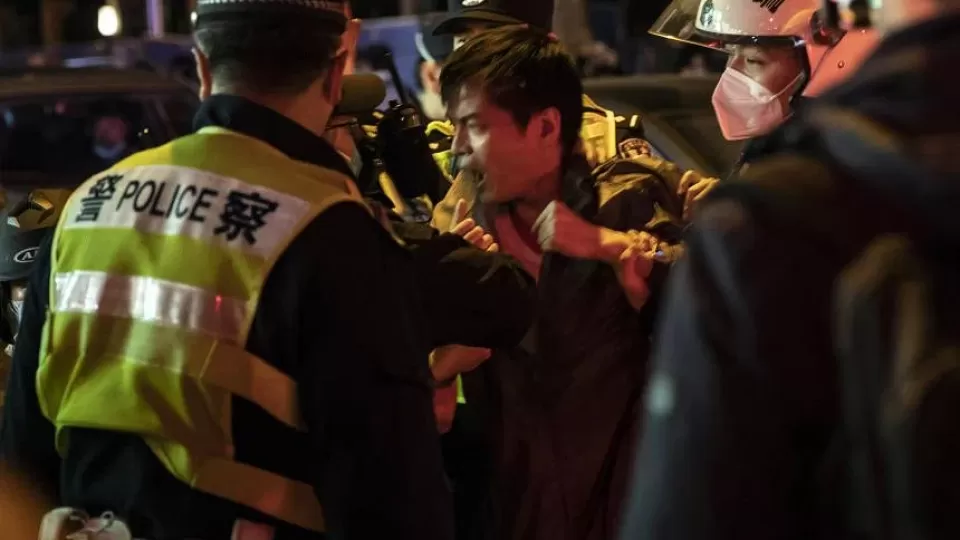November 30, 2022
BEIJING – A game of cat and mouse between Chinese Internet users and censors has kicked into high gear in recent days as anger over the country’s harsh Covid-19 policies burst into the open, while others have found themselves face to face with the country’s surveillance apparatus.
Late last week, as videos circulated of an apartment fire in Urumqi, the capital of Xinjiang, killing 10 people, many around the country viscerally identified with the circumstances. Footage from a neighbouring block showed that rescue efforts appeared to have been hampered by Covid-19 measures and residents were prevented from escaping because the estate had been put under lockdown.
In a country where tens of thousands of housing estates are under some form of lockdown or another to cope with the spike in Covid-19 cases, the fire felt like their worst fears had come true.
But those who took to social media to share their thoughts found the posts removed after a few hours. On Friday night, after Urumqi officials denied that the victims were blocked from escaping and instead blamed residents for having low survival skills, anger over the incident went into overdrive, but any criticism was swiftly deleted.
That was when netizens started getting creative.
Some shared entire articles made up of just one word – the Chinese character for hao (“good”), to express their anger at the censorship. When these got taken down, they turned to other words like “bad”, “neither good nor bad”.
Others would use quotes from officials like former leader Deng Xiaoping, who talked about China opening up; a quote from Xi Zhongxun, the father of President Xi Jinping, who in a speech talked about letting people speak; and a clip of foreign ministry spokesman Hua Chunying berating foreign media for not reporting the “facts and truths” on Xinjiang. The clips of Ms Hua were later deleted.
China has an army of censors – both humans and bots – policing its Internet, but it also exists within the “Great Firewall”, which bars websites like Google, Twitter and even Instagram. The Straits Times website is also inaccessible.
Many get around the information vacuum by using virtual private networks to connect to the outside world, technically a crime in China. Local media platforms are heavily censored and netizens often strive to keep content online for as long as possible, either by taking a screenshot of the content and reposting, or embedding videos within other files.
Certain search terms are automatically blocked, like those referencing sensitive events. But quickly unfolding events, like the Urumqi fire, means pre-set filters may not work, which means relying on human censors to manually review and take down posts.
Late last week, after a Shanghai vigil for victims of the fire turned into a protest, images of the gathering initially made it onto Chinese social media. But as the censorship army wised up, these too were quickly scrubbed.
According to China Digital Times, a website which reports on China’s Internet, much of the content relating to the protest has been scrubbed, including an image of a woman wearing a mask with “404” – referring to a link that has been removed – written on it. An essay titled Fear Not, Children was also taken down from popular messaging app, WeChat.
Much of the censorship appears to be on WeChat.
Protesters in Beijing and Shanghai told The Straits Times their accounts have received warnings after sharing protest content.
A media executive, who wanted to be known only as Jess, said she received a warning after sharing images and videos supporting Saturday’s protest in Shanghai.
“My account has been suspended for a week, so I can’t take part in group chats or post on my WeChat moments (a Facebook timeline-like function),” she said over a secure messaging app.
“Some of my other friends weren’t so lucky, maybe they shared more information, and so they got calls from their local police.”

People at a rally in Beijing on Nov 28, 2022, to protest against China’s harsh Covid-19 restrictions and question how a deadly apartment fire in Urumqi, Xinjiang, killed 10 residents. PHOTO: AFP
In October, many people also found their WeChat accounts blocked or suspended after sharing pictures and videos of a protest on Sitong Bridge in Beijing. Some had even resorted to posting “public confessions” on the Twitter-like Weibo, begging for their accounts to be returned – the super-app is integral to life in China, from communication to payments to even the health codes needed to enter public spaces.
Others who took part in Sunday’s protest in Beijing also believe they had been tracked through apps on their phones.
An advertising executive who went to the event with three others was called up by the police on Monday. He said he was not in any confrontation and did not give his details to anyone.
“After panicking for a bit, I calmed down and reasoned with my friends who all think I probably got targeted because I used my phone to call a car on a ride-hailing app to get to the location,” he said.
“We’ve always known apps like WeChat are being watched because sensitive content can sometimes disappear or not get forwarded but in this case, it’s more extensive than that. Now we know.”


